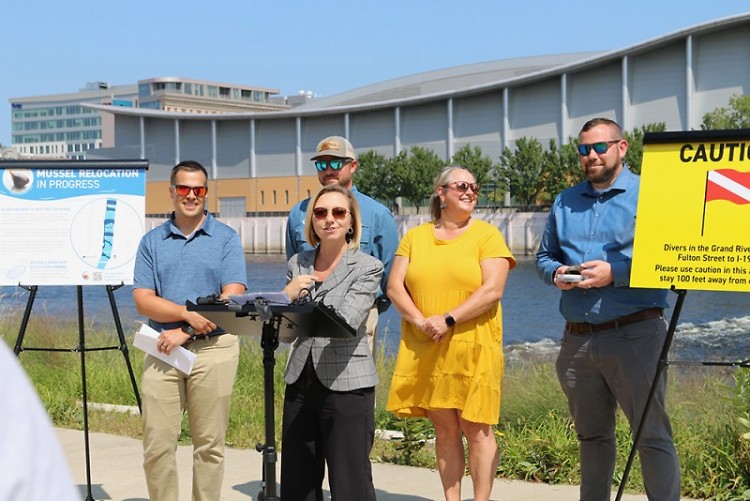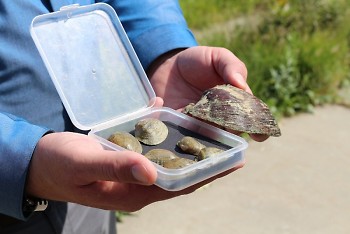The team leading the restoration of the Grand River rapids in downtown Grand Rapids took a significant first step this week by beginning the process of removing federally protected mussels from the river.
“I am excited for this stage of the restoration project as it signals the physical start of bringing the rapids back to Grand Rapids,” said Mayor Rosalynn Bliss during a press conference Thursday afternoon at Ah-Nab-Awen Park.
To begin the in-river construction to remove low-head dams and restore the rapids, teams of divers and biologists will search an area of the Grand River stretching from Bridge Street to Fulton Street for federally endangered Snuffbox Mussel, state threatened and endangered mussels and other common mussel species. The mussels will then be recovered, identified, counted and marked for future monitoring before being put into mesh bags in flowing water until they can be transported to sites up and down the river with similar species and habitats.
The river restoration is being led by the City of Grand Rapids and the Grand Rapids Whitewater project team, in collaboration with the Michigan Department of Natural Resources, the Michigan Department of Environment, Great Lakes, and Energy and the U.S. Fish and Wildlife Service.
The mussel relocation process is expected to last through October, with the start of construction planned for summer 2025, pending the outcome of multiple state and federal permitting processes.
The mussel relocation project will coincide with the annual salmon run in the Grand River through downtown when salmon swim upstream from the Great Lakes to lay their eggs in the river.
Project leaders are asking anglers fishing from boats, wading the rapids and shallows or from shore to use caution and stay at least 100 feet from divers working during this time.
Bliss said this project is part of a larger move to revitalize the riverfront downtown.
“Even though it’s just the beginning, bringing the rapids back to the Grand River has spurred future access to the river,” Bliss said. “Developments already underway along the river — from the Public Museum riverfront expansion to the new Lyon’s Edge park renovation to the Acrisure Amphitheater — are significant placemaking, community building and equitable projects that will make the Grand River a river for all.”
Grand Rapids Whitewater Executive Director Matt Chapman said the goal of revitalizing the Grand River will “improve habitat areas for these species.”
“It has taken years to get to this point, but seeing divers in the river relocating mussels is a significant first step toward having rapids in Grand Rapids once again,” Chapman said
The Rapidian, a program of the 501(c)3 nonprofit Community Media Center, relies on the community’s support to help cover the cost of training reporters and publishing content.
We need your help.
If each of our readers and content creators who values this community platform help support its creation and maintenance, The Rapidian can continue to educate and facilitate a conversation around issues for years to come.
Please support The Rapidian and make a contribution today.

